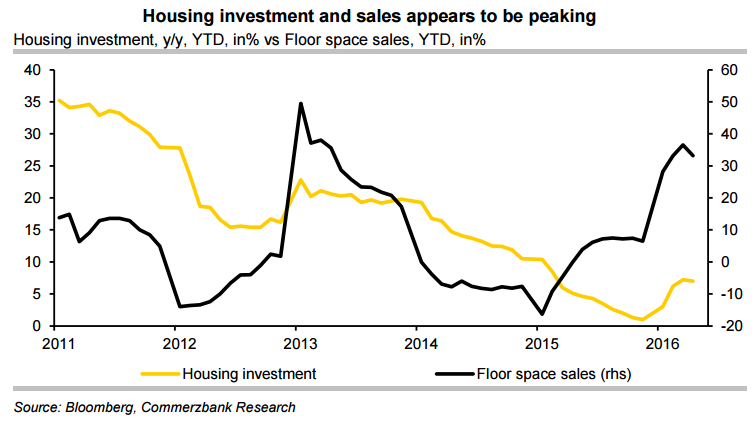According to data released over the weekend by National Bureau of Statistics, China’s property prices are showing some early signals of softness. Average new home prices in 70 major cities climbed 6.9 percent last month from a year ago, accelerating from April's 6.2 percent rise. The NBS data showed 50 of the 70 major cities it tracks saw year-on-year price gains, up from 46 in April.
In the first-tier cities specifically, property prices rose 2.0% m/m in May, down from 2.9% in April and 3.6% in March. On a 4-week moving average basis, the new home sales dropped by 17.6% m/m in the first-tier cities in early June, the biggest drop in one year, excluding the Chinese New Year effects.
"The average (price) growth of new homes in first-tier cities started to narrow, while it continued to widen in second- and third-tier," said Liu Jianwei, a senior NBS statistician.
The floor space sales slowed to 33.2% y/y YTD in May, versus 36.5% in April, and meanwhile, property investment moderated to 7.0% y/y YTD in May, from April’s 7.2%. Data suggests the housing investment and sales appears to be peaking. Investment growth in Chinese real estate slowed in May for the first time since December on a year-on-year basis as tightening measures in big cities took their toll.
Data suggests new property measures introduced in late March are having some initial effects. Recently, China has launched a so-called Macro Prudential Assessment (MPA) framework in Shanghai since Q1. According to the scheme, buyers of second homes are required to pay 50% to 70% of the price of the home as down payment—the old requirement was merely 40%—to get a mortgage.
The MPA is an example of PBoC's tailor-made policy in the property market. The central bank has given up the “one size fits all” policy approach. The Macro Prudential Assessment (MPA) framework introduced in Shanghai since Q1 could have a significant impact on China’s property market over the medium to long term.
"We think that the property market will not become a significant obstacle for further policy easing in China. We think that China’s property market is likely to cool down in the coming quarters, which will increase the downside risk to China’s growth outlook as a result." said Commerzbank in a report.



 UK Starting Salaries See Strongest Growth in 18 Months as Hiring Sentiment Improves
UK Starting Salaries See Strongest Growth in 18 Months as Hiring Sentiment Improves  Japanese Pharmaceutical Stocks Slide as TrumpRx.gov Launch Sparks Market Concerns
Japanese Pharmaceutical Stocks Slide as TrumpRx.gov Launch Sparks Market Concerns  Russian Stocks End Mixed as MOEX Index Closes Flat Amid Commodity Strength
Russian Stocks End Mixed as MOEX Index Closes Flat Amid Commodity Strength  U.S.-India Trade Framework Signals Major Shift in Tariffs, Energy, and Supply Chains
U.S.-India Trade Framework Signals Major Shift in Tariffs, Energy, and Supply Chains  Bank of Japan Signals Readiness for Near-Term Rate Hike as Inflation Nears Target
Bank of Japan Signals Readiness for Near-Term Rate Hike as Inflation Nears Target  Lee Seung-heon Signals Caution on Rate Hikes, Supports Higher Property Taxes to Cool Korea’s Housing Market
Lee Seung-heon Signals Caution on Rate Hikes, Supports Higher Property Taxes to Cool Korea’s Housing Market  FxWirePro: Daily Commodity Tracker - 21st March, 2022
FxWirePro: Daily Commodity Tracker - 21st March, 2022  BTC Flat at $89,300 Despite $1.02B ETF Exodus — Buy the Dip Toward $107K?
BTC Flat at $89,300 Despite $1.02B ETF Exodus — Buy the Dip Toward $107K? 































